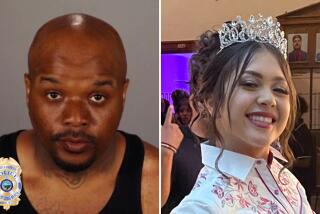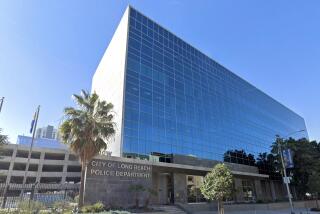Mother’s dream crashes down with son’s killing
- Share via
Victims of street shootings are commonly killed not far from their homes. Friends and relatives hear shots and run out in time to watch a son, husband or brother bleed to death.
This is what befell Angela Cooke on Sunday afternoon.
Her son, Rodney Elijah Love, 15, was a 5-foot, 11-inch teenager with a ready smile, a honey brown complexion and light brown eyes. He loved Dave Chapelle and anything that had to do with comedy. He loved hats. He liked talking to girls.
He lived in South L.A., taking a bus to classes at Reseda High School, but his mother had recently agreed that he could transfer to Westchester High to play football. Cooke had plans for him. “To get a college degree and get himself out of this neighborhood,” she said.
Rodney had to get up at 5 a.m. to catch the school bus to the San Fernando Valley, but he wasn’t allowed to ride MTA buses, she said. He was barely allowed to go outside, Cooke added. He stayed in their apartment near Western Avenue and West 80th Street, playing with the Internet for hours.
He would entertain himself by making photo self-portraits, striking tough poses, though in reality he had to ask permission to go the corner.
On Sunday afternoon, Rodney had a friend over. He begged Cooke to allow them to go outside. She felt bad that he had been cooped up all weekend. Stay close, she told him. She checked on him twice through the window. She lay down for a nap.
Shots jarred her awake. After that, “everything happened in slow motion,” she said.
There was a neighbor in the stairwell saying someone had been shot. Cooke called down the stairs: “Is it Rodney? Is it Rodney?” The neighbor turned reluctant eyes toward her. Cooke ran down, saw Rodney, grabbed her phone and called 911.
She got a recorded message. She tried and tried the number. In desperation, she dropped to her knees next to her son. She prayed. He was alive. His eyes seemed to be trying to look at her. Then they ceased. “I watched the life just leave his body,” she said.
Time was passing. Her outrage grew. Patrol cars showed up before medical aid.
“Why?” Cooke demanded.
An officer tried to explain the policy: To avoid having more people shot, officers sometimes directed paramedics to wait for clearance to enter L.A. shooting scenes. Cooke absorbed this. Later, at California Hospital Medical Center, she begged to see the body but authorities turned her down.
The day after the shooting, she paced the small apartment, seemingly unable to remain still, repeatedly breaking into tears. She recounted details in rapid succession, and returned again to one theme:
“I constantly said, ‘I have to keep my son safe. I have to protect him from these streets,’ ” she said. “I knew where he was at all times. I figured I would let him go outside for a few hours. It should be OK.”
She closed her eyes for a moment. “He was downstairs at his own house. He’s got to be safe there.”
--
This article is adapted from the Homicide Report,latimes.com/homicidereport
More to Read
Sign up for Essential California
The most important California stories and recommendations in your inbox every morning.
You may occasionally receive promotional content from the Los Angeles Times.













